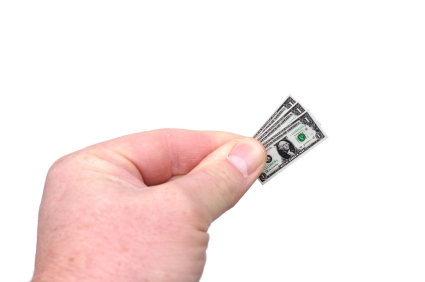In an “Ask the Agent” blog post from last year, a reader asked about the average advance for a first book. According to Chip MacGregor, while the numbers can be wildly variable, most authors are looking at an advance of between $5,000 and $15,000 for a first novel (slightly higher for a first nonfiction book). Considering the amount of time spent writing, editing, and shopping around a novel to find an agent and then a publisher for an author’s first novel can span years, that is barely enough to cover the costs of time spent emailing various parties, never mind making a living at writing.
“That’s not much,” you may be thinking, “But as the book sells, authors get royalties!” While this is true, the term “advance” means “advance on royalties,” meaning the publishing company fronts you a lump sum payment which it will then recoup through your book sales. You will of course start getting royalty checks after the advance is paid off via book sales…if that happens. For a first novel, this is hardly guaranteed. And often, royalties aren’t paid out until well after the book prints and sales are tallied. Often, it can be a few years after your advance before your first royalty checks start showing up.

Other creative pursuits can be an even riskier gamble, as they require overhead costs just to produce the art that the creator is trying to sell. Theater productions begin in the red, with payments for actors, costumes, sets, rental of rehearsal and performance spaces, and royalty rights for playwrights being just the most obvious line items in a production budget.
All the time spent making your work is also time spent away from trying to sell your work. If you don’t have an agent or publicist getting the word out about your creative endeavors (both of which cost you a percentage of your earnings), you can spend more time just trying to find customers for the creative work you’ve poured your heart and soul into.
With all of this work and risk built into the equation of creative work, should artists just resign themselves to being hobbyists or starving? Not necessarily. While it can feel like failure to maintain a full-time position and work on your artistic endeavors, it’s often the best way to assure that artists can keep themselves in a situation where their creative work can continue without the pressure to rely on that work to keep you clothed and fed. Day jobs, whether they are in the same field in which you are working at your art or are entirely unrelated, can be a lifesaver to authors who are between novels, actors who are actively auditioning for roles and filmmakers who need the latest equipment. Often, artists can find jobs that open up new areas of professional fulfillment that use different parts of their brains, talent, and creative skills without interfering in their life’s ambitions.
Often, creative work is considered an “all or nothing” scenario, where quitting your job and going all-in just to see if you can make it based entirely on your own creative output is seen as the only way to test yourself as an artist. But as is the case with any other business pursuit, sometimes starting off part-time and doing something else to pay the bills as you’re establishing yourself is the best way forward.
